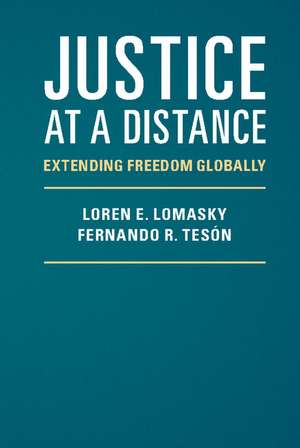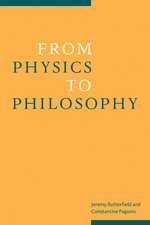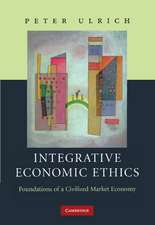Justice at a Distance: Extending Freedom Globally
Autor Loren E. Lomasky, Fernando R. Tesónen Limba Engleză Paperback – 28 sep 2015
| Toate formatele și edițiile | Preț | Express |
|---|---|---|
| Paperback (1) | 279.48 lei 6-8 săpt. | |
| Cambridge University Press – 28 sep 2015 | 279.48 lei 6-8 săpt. | |
| Hardback (1) | 632.98 lei 6-8 săpt. | |
| Cambridge University Press – 28 sep 2015 | 632.98 lei 6-8 săpt. |
Preț: 279.48 lei
Nou
Puncte Express: 419
Preț estimativ în valută:
53.48€ • 57.19$ • 44.59£
53.48€ • 57.19$ • 44.59£
Carte tipărită la comandă
Livrare economică 18 aprilie-02 mai
Preluare comenzi: 021 569.72.76
Specificații
ISBN-13: 9781107536029
ISBN-10: 1107536022
Pagini: 293
Dimensiuni: 152 x 229 x 17 mm
Greutate: 0.4 kg
Editura: Cambridge University Press
Colecția Cambridge University Press
Locul publicării:New York, United States
ISBN-10: 1107536022
Pagini: 293
Dimensiuni: 152 x 229 x 17 mm
Greutate: 0.4 kg
Editura: Cambridge University Press
Colecția Cambridge University Press
Locul publicării:New York, United States
Cuprins
1. The state of the world; 2. What do we owe distant others?; 3. Choosing wealth, choosing poverty; 4. Immigration; 5. Emigration and the brain drain objection; 6. Justice and trade; 7. States; 8. War, self-defense, and humanitarian intervention; 9. Beyond justice at a distance.
Recenzii
'Robust, engaging, and smart … Lomasky and Tesón start from first philosophical principles before considering several highly topical issues, including diplomatic pressure, boycotts, the use of mercenaries, political assassination, humanitarian intervention, and global trade. [This study] offers a stimulating and powerful alternative to cosmopolitan egalitarian accounts of global justice that have dominated discussions … a tour de force.' James Pattison, University of Manchester
'A forceful and elegant defense of global freedom, addressing contemporary controversies concerning global poverty, trade, immigration, our duties to distant others, and war.' Christopher W. Morris, University of Maryland
'Discussions of the impact of international aid on development challenges typically have two big problems: first, they don't have a proper theory of why poor countries are poor in the first place; second, they take place without making clear the normative assumptions underpinning the policies. This highly original book proposes a way to simultaneously solve both problems.' James A. Robinson, Wilbur A. Cowett Professor of Government, Harvard University, Massachusetts
'What do we owe the world's poor? Not resource egalitarianism, but the opportunity, the dignity, and the freedom to participate in the global market economy, and to realize the great gains from productive specialization and peaceful cooperation … A must read for all students of philosophy, politics, and economics and in particular for those who care about the plight of the least advantaged throughout the world and the fundamental questions of economic and political development.' Peter Boettke, George Mason University, Virginia
'A mainstream economist might ask why philosophers of global justice seem so antagonistic to the institutions that actually spur economic development and alleviate poverty …A good theory of global justice must be grounded in, not ignorant of, development economics. Lomasky and Téson take the facts seriously, and thus have produced a remarkable theory of global justice that will change the conversation for the better.' Jason Brennan, McDonough School of Business, Georgetown University
'An important and timely contribution to the debate on global justice. Lomasky and Tesón keep their eyes on the big picture, asking some of the most difficult and important questions of our time, while offering answers that might actually help. They have written a clear, incisive, and empirically informed book that fills a real hole in the debate. A statement that all in the field will have to contend with.' Bas van der Vossen, University of North Carolina, Greensboro
'Justice at a Distance presents a powerful case that justice requires letting others alone. This seemingly simple directive has the potential to massively improve the welfare of individuals across the globe. With their sophisticated grasp of economics, philosophy, and law, Lomasky and Tesón persuasively demonstrate that the best way to help people is to stop hurting them through ill-conceived policies, such as trade and immigration restrictions, that continue to immiserate the world's poor.' Jonathan Klick, University of Pennsylvania
'A forceful and elegant defense of global freedom, addressing contemporary controversies concerning global poverty, trade, immigration, our duties to distant others, and war.' Christopher W. Morris, University of Maryland
'Discussions of the impact of international aid on development challenges typically have two big problems: first, they don't have a proper theory of why poor countries are poor in the first place; second, they take place without making clear the normative assumptions underpinning the policies. This highly original book proposes a way to simultaneously solve both problems.' James A. Robinson, Wilbur A. Cowett Professor of Government, Harvard University, Massachusetts
'What do we owe the world's poor? Not resource egalitarianism, but the opportunity, the dignity, and the freedom to participate in the global market economy, and to realize the great gains from productive specialization and peaceful cooperation … A must read for all students of philosophy, politics, and economics and in particular for those who care about the plight of the least advantaged throughout the world and the fundamental questions of economic and political development.' Peter Boettke, George Mason University, Virginia
'A mainstream economist might ask why philosophers of global justice seem so antagonistic to the institutions that actually spur economic development and alleviate poverty …A good theory of global justice must be grounded in, not ignorant of, development economics. Lomasky and Téson take the facts seriously, and thus have produced a remarkable theory of global justice that will change the conversation for the better.' Jason Brennan, McDonough School of Business, Georgetown University
'An important and timely contribution to the debate on global justice. Lomasky and Tesón keep their eyes on the big picture, asking some of the most difficult and important questions of our time, while offering answers that might actually help. They have written a clear, incisive, and empirically informed book that fills a real hole in the debate. A statement that all in the field will have to contend with.' Bas van der Vossen, University of North Carolina, Greensboro
'Justice at a Distance presents a powerful case that justice requires letting others alone. This seemingly simple directive has the potential to massively improve the welfare of individuals across the globe. With their sophisticated grasp of economics, philosophy, and law, Lomasky and Tesón persuasively demonstrate that the best way to help people is to stop hurting them through ill-conceived policies, such as trade and immigration restrictions, that continue to immiserate the world's poor.' Jonathan Klick, University of Pennsylvania
Notă biografică
Descriere
Justice at a Distance argues that global justice is largely caused by ill-designed local political structures, not because of insufficient aid.












